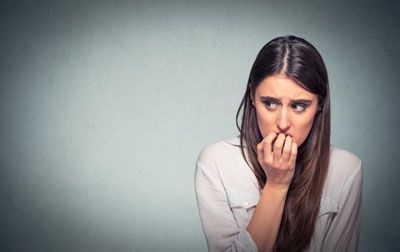Learn about Anxiety Disorder, Treatment and Its different Form
In life, we have a different way of approaching problems. We have our own different way to handle our emotions and feelings. And the most common feelings we encounter in our everyday life are nervousness, worrying and fear. These are signs of having an anxiety. Its normal to a person to experience these feeling once in a while but if those feelings begin to have an impact on your personal life, work or health then it is no longer normal, you may already have an Anxiety Disorder.

What is Anxiety?
Is a general term for several disorders that cause nervousness, fear, apprehension, and worrying. These disorders affect how we feel and behave and can cause physical symptoms
It is a common occurrence when a person faces potentially problematic or dangerous situations. It is also felt when a person perceives an external threat. However, chronic and irrational anxiety can lead to a form of Anxiety Disorder.

Anxiety Disorders
are a group of mental disorders characterized by significant feelings of anxiety and fear. These feelings may cause physical symptoms, such as a fast heart rate and shakiness. There are different types of anxiety disorder depending on their causes or triggers
Common forms of anxiety disorders
Generalized anxiety disorder
A person who has this type of anxiety disorder usually experience prolonged anxiety that is often without basis. More accurately, people with generalized anxiety disorders cannot articulate the reason behind their anxiety. This type of anxiety usually last for six months and often affect women. Due to the persistence of the anxiety, people affected with generalized anxiety disorder constantly fret and worry. This results in heart palpitations, insomnia, headaches, and dizzy spells.
Specific phobia
Unlike someone with a generalized anxiety disorder, a person who has a specific phobia experiences extreme and often irrational fear of a certain situation or object. When exposed to the object or situation they fear, people with specific phobias exhibit signs of intense fear like shaking, shortness of breath, heart palpitations, and nausea. Common specific phobias include fear of heights, enclosed spaces, blood, and animals. The fear a person with phobia feels can be so extreme that he or she may disregard safety just to escape the situation.
Panic disorder
Also known as Agoraphobia, panic disorders are characterized by recurring panic attacks which are often unexpected. Symptoms are usually shaking, chest pains, dizziness, fear of losing control, and reluctance of being alone. People with panic disorder are aware that their panic is usually unfounded and illogical. This is why they avoid public situations and being alone. A panic attack can be so severe that people may lose control and hurt themselves.
Social phobia
Alternatively called social anxiety, a person with social phobia may exhibit similar symptoms like those of panic disorder especially in social situations. Shaking, dizziness, shortness of breath, and heart palpitations may ensue when a person with social phobia finds his or herself at the center of attention or in the company of many people, regardless whether they are strangers or not.
Obsessive-compulsive disorder
People with obsessive-compulsive disorder experience anxiety caused by a persistent obsession or idea. They tend to avoid experiencing anxiety by resorting to repetitive actions or behaviors that prevent anxiety. For example, a person who is obsessed about cleanliness may experience anxiety at the mere sight of a vase placed slightly off-center. To prevent anxiety, he or she will clean and organize everything compulsively or without reason.
PTSD
Post-traumatic stress disorder may occur after a person experienced a severely traumatic event. He or she may relive the experience in his or her mind which causes stress and anxiety. If a person with PTSD comes into contact with stimuli (any object, person, or situation) that he or she associates with the traumatic event, he or she may literally re-experience the event by crying uncontrollably, panicking, or losing control. Subtler symptoms include insomnia and avoidant behavior. PTSD may manifest itself immediately after the traumatic event or even years after.
Treatment
Anxiety disorders are often treated using specific methods and techniques designed to target symptoms and develop coping mechanisms for the anxiety triggers. Knowing which method to use in the treatment mostly depends on the kind of disorder

SELF TREATMENT
This kind of treatment allows a person to treat his anxiety at home without the doctor's supervision but this is just only limited to a short period of anxiety
Some actions recommended to cope with these kinds of anxiety are:
- Stress management
- Relaxation techniques
- Exercise to replace negative thoughts with positive one
- Physical exercise
COUNSELING
Psychological counseling is the standard approach in this kind of treatment and also include a combination of therapies.
MEDICATIONS
Anxiety disorder can also be treated using several types of drugs. Just always refer to the prescription of your doctor.
PREVENTION
It is said that prevention is always better than cure. Although Anxiety disorder cannot be prevented and feeling anxious is a part of our everyday life as a normal person but still, there are ways that we can do to lessen the risk of having a full-blown anxiety disorder
- Reduce caffeine, tea, cola, and chocolate consumption.
- Maintain a healthy diet.
- Check with a doctor or pharmacist before using over-the-counter (OTC) or herbal remedies to see if they contain chemicals that may make anxiety worse.
- Avoid alcoholic drinks
- Keep a regular sleep pattern.
- Have a regular exercise
It is important for us to know these kinds of disorders so that we can act or help other people or our loved ones and relatives accordingly
STAY HEALTHY EVERYONE!!!

giphy
References:
https://en.wikipedia.org/wiki/Anxiety_disorder
https://www.medicalnewstoday.com/info/anxiety
https://www.everydayhealth.com
Image Sources
anxiety image
anxiety disorder image
treatment image

TILLNEXT TIME AWESOME PEOPLE

If you find the post interesting please upvote/resteem and follow me at @cejero021

see a psychiatrist if you can find one and afford it. it turned my life around, big time.
its a nice article bro that you tackle about anxiety disorder treatment..
Glad you liked it dude. Thanks..
This is very timely to have this topic so that we can be aware of this kind of illness.
Congratulations! This post has been upvoted from the communal account, @minnowsupport, by cejero021 from the Minnow Support Project. It's a witness project run by aggroed, ausbitbank, teamsteem, theprophet0, someguy123, neoxian, followbtcnews, and netuoso. The goal is to help Steemit grow by supporting Minnows. Please find us at the Peace, Abundance, and Liberty Network (PALnet) Discord Channel. It's a completely public and open space to all members of the Steemit community who voluntarily choose to be there.
If you would like to delegate to the Minnow Support Project you can do so by clicking on the following links: 50SP, 100SP, 250SP, 500SP, 1000SP, 5000SP.
Be sure to leave at least 50SP undelegated on your account.